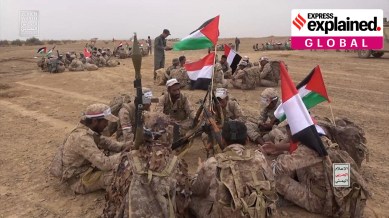Why Yemeni Houthis’ attack on Israel has many worried
Who are the Houthis? Why have they attacked Israel? And why is the attack sending alarm bells ringing?

Yemen’s Houthis have waded into the ongoing conflict in Palestine, declaring on Tuesday (October 31) that they had fired drones and missiles at Israel.
Houthi military spokesperson Yahya Saree said in a televised statement the group had launched a “large number” of ballistic missiles and drones towards Israel, and there would be more such attacks to come “to help the Palestinians to victory”, Reuters reported. He said it was the Houthis’ third attack on Israel since the start of the conflict.
monthly limit of free stories.
with an Express account.
While the Houthis might not pose any real danger to the Israelis, roughly 2000 km away, the attacks have nonetheless set alarm bells ringing across the region. Why? We take a look.
But first, who are the Houthis?
The Houthis are a large clan belonging to the Zaidi Shia sect, with roots in Yemen’s northwestern Saada province. The Houthi movement, officially called Ansar Allah (Supporters of God), began in the 1990s against the dictatorship of Yemeni President Ali Abdullah Saleh.
Today, the Houthis are one faction in a bloody civil war that has raged in Yemen since 2014. They currently control territory in the west and northwest of Yemen, including the capital Sana’a.
The Houthis, backed by Iran, are a part of what Iran calls, “The Axis of Resistance” — an informal anti-Israel and anti-West political and military coalition that it leads. Other notable groups in the Axis include Hezbollah and Hamas. In Yemen, the Houthis are fighting against the Sunni-led internationally recognised Yemeni government, backed by Saudi Arabia and the UAE.
Most experts see the civil war in Yemen as a proxy war between Iran and Saudi, the two foremost Islamic powers in the world.
Why have they attacked Israel?
The Houthi attack is the latest in a string of attacks launched by members of the Axis on Israel and the US, Israel’s greatest allies. Reuters reported that Iran-backed Iraqi militias have been firing at US forces in Iraq and Syria, while Hezbollah has been exchanging fire with Israeli forces at the Lebanese-Israeli border.
“Resistance groups will not remain silent in the face of the Zionist regime’s crimes and America’s full support for the Zionist regime,” Iran foreign minister Hossein Amirabdollahian said on Tuesday as reported by Iranian state media.
The Houthis themselves have always been anti-Israel and anti-West. Since the early 2000s, the popular Houthi slogan has been “God is the greatest, Death to America, Death to Israel, Curse on the Jews, Victory to Islam” (in Arabic).
Saree blamed Israel for instability in the Middle East, saying the “circle of conflict” in the region was being expanded by its “continued crimes”. He said that the Houthis will continue to mount attacks “until the Israeli aggression stops”.
Why is this a concerning development for the conflict in the Middle East?
The Houthis have previously shown their missile and drone capabilities, most notably in 2019 when they attacked Saudi oil installations, temporarily cutting more than half of Saudi’s oil output. However, in the current situation, where they are roughly 2,000 km away from their target, they pose little actual danger to the Israelis.
Noting that Houthi missiles and drones had been shot down during the latest hostilities, Mohanad Hage Ali of the Carnegie Middle East Center told Reuters that for now, Houthi attacks were “more about messaging than a real military threat”.
The more real danger lies in the fact that such attacks can eventually lead to all out war in the Middle East. So far, Israel’s aggression has not been met by a military response from any of its Muslim neighbours. But the Houthi attacks put the Saudis in a precarious position, since the most direct flight path for any drone or missile launched from Yemen passes over western Saudi Arabia.
In the current state of affairs, the Saudis — who view themselves as leaders of the Islamic world — may not want to be seen to be supporting Israel by censuring the Houthis for the attack. At the same time, they would also not want to overtly side with the Houthis, a proxy arm of Iran, Saudi’s greatest rival both in theological and geopolitical terms.
“I think the problem is that this war has the potential to put Saudi in a position where it is seen to take sides between the US and Israel, and Iran,” Saudi analyst Aziz Alghashian told Reuters.
Thus far, Saudi Arabia has done little more than make strongly worded statements against Israel. However, it might be pushed to escalate things, especially if the Israelis decide to hit back at Sana’a, again using Saudi airspace.
Importantly, if the Saudis do enter the conflict, something they are definitely averse to, the resulting escalation could throw the whole of the Middle East into war.